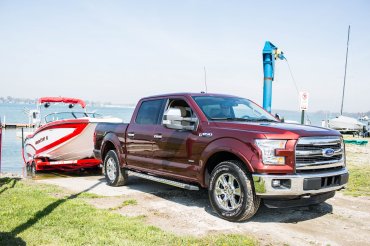Ford Motor Co. recently amended its engine oil guidance for small-engine diesel-powered pickups, including the diesel version of the F-150, to recommend API FA-4 oils. The decision represents a slight softening of the automakers cautious stance toward the newest diesel engine oil categories.
Ford still refuses to recommend FA-4s companion category, API CK-4, for use in diesel-powered trucks with larger 6.7- and 3.2-liter engines, instead opting for its own specification, WSS-M2C171-F1.

Photo: Courtesy of Ford Motor Co.
Ford Motor Co. recently amended its engine oil guidance for small-engine diesel-powered pickups, including the diesel version of the F-150, to recommend API FA-4 oils.
FA-4 and CK-4 are latest diesel engine oil categories from North Americas engine and lubricant industries. Introduced in December 2016, CK-4 was developed to provide improved performance in 2017 and older on-highway trucks, except for new trucks designed to meet a 2017 mandate limiting greenhouse gas emissions. Trucks subject to that regulation have fuel economy requirements, which FA-4 was developed to help achieve. But FA-4 was developed specifically for those 2017 trucks and not for use in ones made in previous model years.
Ford has declined to recommend the new categories for many vehicles, citing concerns such as whether they provide adequate protection from engine wear. Instead the company has recommended oils meeting its own specification or the previous API specification.
The new guidance, issued in March, advises use of FA-4 oils for service fill in F-150 trucks with 3.0-liter diesel engines, which are new in 2018, and the Transit Connect, which will have a 1.5-liter engine when introduced in 2019. The company added, though, that it still believes FA-4 does not match the wear protection of API CJ-4, the previous category.
Ford still recommends against using FA-4 oils in larger Ford diesel engines, like the 3.2L and 6.7L diesel engines, as well as the older Ford diesel engines, the advisory stated.
The Ford F-150 series of pickup trucks is the single largest selling vehicle in North America. In 2018, combined sales of its various models are expected to reach approximately 900,000. Five percent of these will be powered by diesel engines.
Ford has noted that the F-150 has a 3.0L diesel engine. Its 6.7L engine, which is used in Super Duty pickups, provides more power and generates more torque, thus causing the need for greater wear protection, which Ford says is provided by WSS-M2C171-F1.
Ford is not the only diesel engine maker to have exercised caution with FA-4. Daimlers North American subsidiary is currently the only OEM in the region that uses FA-4 for factory fill, and the company also recommends it for engines going back to model year 2010. All other heavy-duty engine manufacturers recommend factory fill with SAE 10W-30 oils meeting CK-4. Cummins recommends API FA-4 for certain engines but not generally.
Use of API FA-4 has been limited by the issue of backwards compatibility. The heavy-duty diesel fleet in North America averages 14.4 years in age. The older engines in service require a high-temperature, high-shear rate viscosity of at least 3.5 centiPoise, while API FA-4 specifies HTHS viscosity of 2.9 to 3.2 cP.
One oil industry representative, who asked not to be identified, predicted that Fords revised guidance will not make a measurable impact on the pace of FA-4s uptake, which will continue to lag behind the large volumes of CK-4 oil recommended for larger heavy-duty diesel engines in the U.S. market.
Until the older engines in the fleets are replaced or new test data are developed showing that the lower viscosity will protect these older engines, API FA-4 will be a relatively minor part of the market. Of course, if fuel economy requirements become even more restrictive, API FA-4 could grow more rapidly.